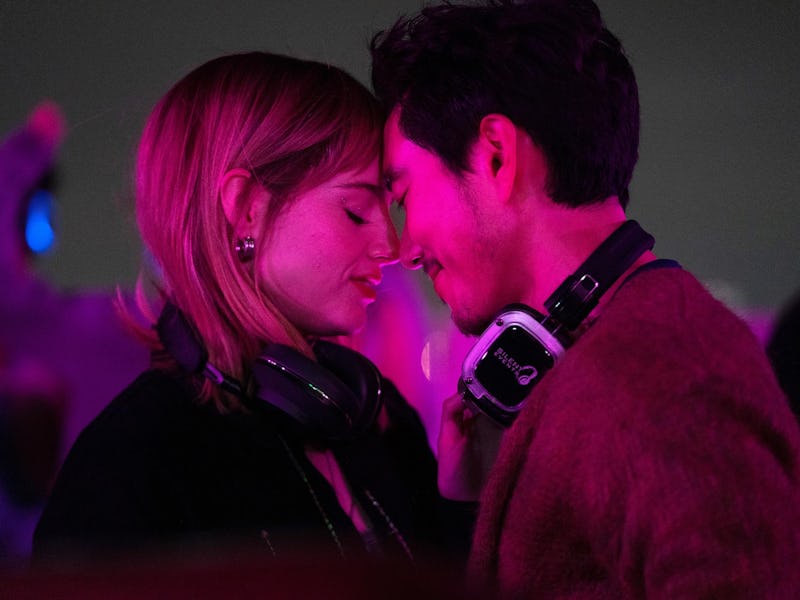The Greatest Hits Is a High-Concept Remix of Romantic Clichés
Time travel is metaphor for grief — and music is the key to unlocking it — in this lo-fi romantic drama.

Grief is never convenient. It can manifest at the least opportune moments, and can be triggered by the most innocuous things. Whether it be a scent or a song, memory has a way of latching on, bringing up moments that we’d rather suppress.
Harriet (Lucy Boynton) understands that plight better than anyone. It’s been two years since her boyfriend Max (David Corenswet) had a fatal car accident — and thanks to some head trauma she sustained in the crash, she often finds herself reliving moments of their relationship, over and over, incapable of moving on.
Unfortunately, that’s not a metaphor: these flashbacks are visceral and real, each triggered by a song she experienced with Max. One takes her back to their meet-cute at a music festival; another transports her to a blissful beach day. On paper, it’s kind of romantic. But in Harriet’s story, orchestrated by writer-director Ned Benson, it’s painfully inconvenient.
The Greatest Hits is not afraid to indulge in some soul-stirring melodrama. It coasts the highs and lows of lost love with its heart on its sleeve, making for a story with an intimate scope. But believe it or not, it’s the sci-fi elements that give this story the grounding realism that it needs. As in a handful of cerebral sci-fi dramas, time travel is a fitting metaphor for grief. It’s also the very thing that keeps his sophomore effort from sinking beneath the weight of its played-out romantic clichés.
Harriet has traced the breadth of her life with Max by the songs they first listened to together, but there’s one moment in her life, one song, that remains unaccounted for. Harriet is still searching for the tune that will help her change the past, potentially saving Max’s life. But she can’t spend all her time combing through their record collection. Sooner or later, she has to rejoin the real world — and with the help of ever-present noise-canceling headphones, she can commute to her job at the library (because it’s quiet, of course) or her group therapy sessions without triggering another flashback.
From the outset, it’s very clear that Harriet is not living. Her condition has turned her from a promising music producer to a hermit, and the apartment she once shared with Max has become a shrine fit for a stalker. Among a careful catalog of songs she’s marked “safe” — from crates upon crates of her record collection — hangs a relationship timeline defined by music. She’s pushed everyone out of her life, her own mother included. The only one that’s stuck around is her gay best friend Morris (Austin Crute), who conveniently pops up whenever Harriet needs a confidence boost.
Boynton delivers an understated, aching performance as Harriet.
Crute’s performance is a definitive highlight, especially when paired with Boynton’s sullen, skittish lead. His effortless charm serves as an indicator of the kind of person Harriet used to be, and the film gains some much-needed levity whenever he’s around. Still, his limited role is one of many frustrating examples of an underbaked plot.
The Greatest Hits might be more enamored with its time-trekking premise than it is with the characters affected by it. That’s especially evident in the bond between Harriet and Max — or more appropriately, Max’s memory. Each flash back to a moment in their relationship is tinged with dread, which definitely works, given the circumstances. But we don’t learn much about Max during these brief exchanges; that’s partially because Harriet is so determined to change his fate. Otherwise, it’s conversations between Harriet and Morris that explain just who Max was when he was alive.
That instinct pushes the character into another vexing sci-fi trope: that of the Dead Wife in a Flashback. It’s interesting to see the gender roles reversed here, especially given Corenswet’s shifting role in the zeitgeist. (He’s about to be Superman!) Still, it would have been nice to see him get the chance to embody an actual character, rather than a ghost holding Harriet back.
Harriet’s quest to save her late boyfriend is the crux of the conflict here, but it never gets the substance it deserves.
Things get more interesting with the introduction of David (Justin H. Min), the latest member of Harriet’s support group. He’s grieving the loss of parents, but he clicks with Harriet instantly. With him, our heroine forges new memories attached to familiar tunes (the most endearing being an impromptu jam session to Nelly Furtado’s “I’m Like a Bird”), and slowly opens herself up to the idea of love. But intimacy is hard when you can’t leave the house without covering your ears. The closer Harriet gets to David, the more the lines between past and future blur. It’s here that The Greatest Hits shifts into a more urgent clip, settling finally into a story you don’t want to look away from.
Min’s chemistry with Boynton carries The Greatest Hits through some of its sillier sci-fi beats, including a confrontation that forces Harriet to prove that she can, in fact, meddle with time. The promise of new love — and the threat of more loss — injects their relationship with real, aching stakes. Any student of romance and sci-fi will likely know how this could end. Benson’s high-concept love story might be unique, but it’s not reinventing the wheel. That’s as much a virtue as it can be a vice, as The Greatest Hits is sampling the classics whenever it can. Nostalgia and novelty live side-by-side here, and it’s that fusion that ultimately delivers a solid exercise in rebirth.